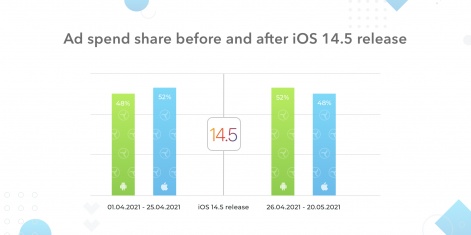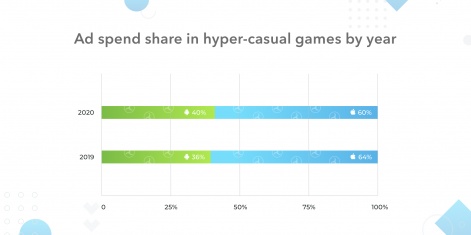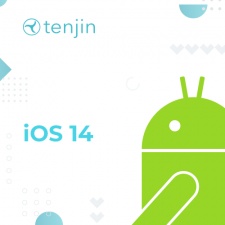With uncertainty continuing around iOS 14.5, advertisers are shifting their budgets to Android. While publishing on Google Play remains one of the most obvious options, the potential of acquiring users in alternative Android app stores is creating a larger opportunity for developers and marketers.
Publishers are constantly searching for new platforms that have a high-quality user base, together with the option to continue with deterministic attribution. That’s why Tenjin feels that this is a perfect time to announce support for alternative Android app stores.
All Tenjin clients can now start measuring advertising performance for the alternative Android stores. This includes install attribution, return on investment (ROI), lifetime value (LTV) measurement and all the features that are currently available for Google Play and iOS apps.
Android ad spend overtaking iOS
Following the release of iOS 14.5, advertisers are allocating more of their budgets to Android than to iOS. Android spend has increased to the point it has now overtaken iOS ad spend share.

Interestingly, this migration of ad spend occurred over the last two years. Below is the data from two of Tenjin's hypercasual benchmark reports.

As you can see, the trend was actually developing long before iOS 14 and Apple changes only seem to have boosted it. Tenjin expects this trend to continue and for more budgets to get allocated to Google Play.
Due to the rise in competition, it’s fair to expect to see a rise in cost per install (CPI) too and changes in other user acquisition metrics. That is why this is the perfect time to start leveraging what alternative Android stores can offer.
The key to scaling in China is alternative Android app stores
The first country that comes to mind when we talk about alternative Android stores is, of course, China. Google Play has not been available in China since 2011. That resulted in the formation of a new app store ecosystem in China that consists of over 300 stores. Moreover, the share of iOS devices is only 13 per cent (as of Q1 2021).
It’s evident that in order to tap into the Chinese user base, publishers need to figure out how to market their apps in alternative Android stores. Just to give one example: As of February 2021, Huawei AppGallery enjoyed the biggest share in Android stores in China. It has roughly 37 per cent of the market share, which translates into an eye-opening number of 261,389,000 monthly active users (MAU). Finally, good news for game publishers: there is a special category for games-only app stores in China.
#311 user acquisition in China 101
Of course, advertising in China is something different compared to the traditional ways of advertising on mobile. This is why Tenjin is introducing new training called ‘#311 User Acquisition in China 101’. Tenjin customers can contact the company to access this training.
How to get started with alternative Android stores
When Tenjin was developing this new feature, it wanted to make sure that It provided a simple, flexible setup. It only takes two steps to start working with alternative Android stores:
- Install the new Android or Unity SDK (version 1.12.5)
- Add the store URL or the URL that hosts the APK files to the new Tenjin app
Full details are available on the dedicated documentation page.
Under the hood, the company is using two device identifiers: OAID and IMEI, to do the attribution.
You can also sign up for free here, or find out more about the company's tools online. Send any questions or feedback directly to Tenjin. Good luck.

















